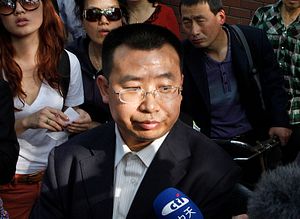As families across the United States were preparing for their Thanksgiving feasts last month, a Chinese court in Changsha sentenced prominent rights attorney Jiang Tianyong to two years in prison. His alleged crime was trying to “overthrow the socialist system” by publishing articles online, speaking to foreign news outlets, and publicizing his clients’ cases via social media. At first glance, the timing of the decision may appear coincidental. But the Chinese government has a long history of sentencing free expression activists or ramping up censorship while observers in leading democracies are distracted with major holidays. This year may be no different.
Just two years ago, Guo Feixiong, another well-known activist, was sentenced to six years in prison on Black Friday, the day after Thanksgiving and one of the biggest holiday shopping days in the United States. Guo was punished for protesting in support of newspaper journalists who had gone on strike in 2013 over increasingly heavy-handed censorship. He was held in custody for more than two years, and had been the subject of numerous international appeals, reinforcing the suspicion that his sentencing was planned with the U.S. holiday in mind.
Such cases have occurred around Christmas and New Year’s Eve as well. Nobel Peace Prize laureate Liu Xiaobo received his 11-year prison sentence for online writings and a prodemocracy manifesto on Christmas Day in 2009. Prominent attorney Pu Zhiqiang — who had defended dissident artist Ai Weiwei, among other clients facing reprisals for criticizing the Chinese government — was handed a three-year suspended sentence on December 22, 2015.
On December 30 of that year, Lee Bo, one of several detainees linked to a Hong Kong publishing company known for salacious books about China’s leaders, mysteriously disappeared from the territory, only to reemerge in custody in China. He was apparently abducted and smuggled across the border by Chinese security agents in an unprecedented move that sent a chill throughout Hong Kong society.
The Chinese authorities have also chosen holiday periods to carry out acts of censorship against foreign news organizations or technology companies, which may respond less quickly or robustly when executives are trying to spend time with family.
For example, under pressure from Beijing, Apple removed the New York Times mobile phone application from its online store in China on December 23, 2016. The paper chose not to report on the change until January 4, perhaps realizing that it would get more attention from the media and policymakers after the New Year. Two years earlier, on December 28, 2014, Google’s Gmail email service was blocked in China — especially for mobile phone mail applications. The service had suffered months of disruptions, but tools tracking Google traffic showed a sharp drop that day.
To the credit of international news organizations and foreign governments, despite the awkward timing, these incidents do get coverage and official responses, such as expressions of concern from the U.S. State Department. Still, with reduced staff during holidays, embassies may not have the manpower to send observers to a sentencing hearing or issue a statement as quickly as they might otherwise. And even if news organizations report on the unjust jailing of people like Liu Xiaobo and Jiang Tianyong, readers and viewers naturally pay less attention to these and other stories during their time off.
Looking ahead to this holiday season after a year of intensified online censorship, several prominent human rights lawyers remain in custody. Most notably, Wang Quanzhang has been held incommunicado for over two years, and his lawyers were again denied access to him last week. He may be put on trial soon. Gao Zhisheng, a Christian who suffered horrific torture in the past, was taken back into custody in August.
All those who care about the fate of these men, as well as the tens of thousands of other political and religious prisoners languishing in Chinese prisons or detention centers, would do well to watch for and respond to any further penalties or restrictions in the coming weeks.
The apparent holiday pattern suggests that Chinese authorities are more sensitive to international pressure than they would like to admit. Even if a public outcry fails to improve prisoners’ situations (though it often does), the Communist Party leadership should at least be put on notice that it cannot hide its shameful decisions behind celebrations of peace, joy, and gratitude.
Sarah Cook is a senior research analyst for East Asia at Freedom House and director of its China Media Bulletin.
































